Mar 2017
Harbor seal pup harassed at Alki Beach - always stay back
Mar/27/17 09:02 AM
(see update at end of post)
A harbor seal pup, trying to come ashore yesterday to get some much-needed rest, was consistently harassed by people and repeatedly scared into Puget Sound. When Seal Sitters MMSN First Responders arrived at sandy Alki Beach, the pup was nowhere in sight. After waiting for about an hour with no sign of the pup, informational signs posted on the seawall above the beach and on the beach itself in hopes it would remind people to STAY AWAY from seal pups.
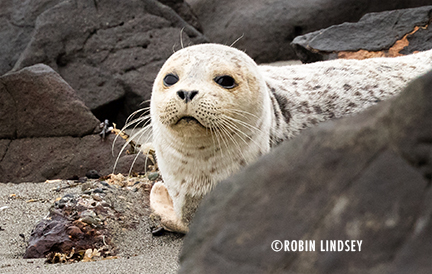 Within a couple of hours, the pup had returned and was trying to come ashore. Once again, a crowd of people stood too close above the pup and scared him in. Thankfully, Seal Sitters’ First Responder Lynn was out for a walk and a check of the beach.
Within a couple of hours, the pup had returned and was trying to come ashore. Once again, a crowd of people stood too close above the pup and scared him in. Thankfully, Seal Sitters’ First Responder Lynn was out for a walk and a check of the beach.
She managed to get people to step away from the edge and the seal pup returned ashore. Lynn set about taping off the small bit of beach. As she was doing so, an off-leash dog was approaching and Lynn firmly asked the owner to please remove her dog, illegally on the beach.
First Responder Robin and Lynn then proceeded to tape off access to the top of the seawall which was directly above the pup, just feet below. Protected Marine Mammal and Seals Need to Rest info signage was placed at intervals to educate the public. The pup settled into small crannies between the black boulders at the end of the beach. As the incoming tide forced her to move in and out between rocks, we would get glimpses of the stunning pup (photo above), who looked relatively robust for a approximately 7 or 8-month old weaned pup. This pup, nicknamed (Saltwater) Taffy seems to be doing better than our most recent weaners who have been using West Seattle’s shoreline.
Despite rainy and cold weather, there were still alot of people out on a Sunday afternoon. As the tide receded late in the day, the skittish pup - anxious due to the earlier harassment - emerged from his rocky hiding place to stay closer to the waterline for an easier escape if necessary. The down side of this is that the pup was now fully visible from the sidewalk above and only about 25 feet from the wall. Seal Sitters could not increase the depth of the perimeter because we could not force pedestrians into the bike lane or street for public safety concerns.
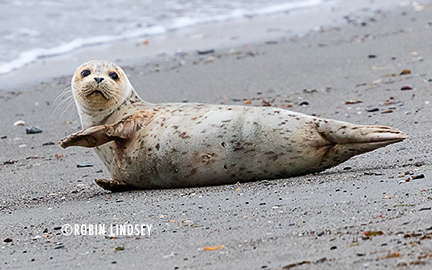 The increased activity and noise of passersby gathering above her, created undue stress for Taffy. Off-duty First Responders Dana and Melinda lent a helping hand and attempted to keep people moving, asking them to observe from the ends of the perimeter, where they had an unobstructed and closeup view as well. You can see in the photo at left that Taffy is visibly stressed by the activity above and behind her.
The increased activity and noise of passersby gathering above her, created undue stress for Taffy. Off-duty First Responders Dana and Melinda lent a helping hand and attempted to keep people moving, asking them to observe from the ends of the perimeter, where they had an unobstructed and closeup view as well. You can see in the photo at left that Taffy is visibly stressed by the activity above and behind her.
The definition of harassment or “take” of a marine mammal as defined by NOAA’s Marine Mammal Protection Act is any human (or domestic dog) presence that causes an animal to change his/her behavior. This most certainly includes the disruption of a seal’s rest and scaring the animal back into the water. ALWAYS STAY BACK from resting seals. Rest is crucial to their survival.
Taffy rested until late into the night as cold and wet volunteers dispersed. During the night, First Responder David tightened up the windblown perimeter, pounding the now-wobbly stakes deeper into the ground and adjusting the length of the tape on the beach to accommodate for the tide.
The pup was gone from the beach at 4:30am and again at 5:30 when volunteers Nicole and Eric checked the perimeter. At 6:30am, Robin arrived the site, but there was still no sign of Taffy. However, shortly afterwards, a river otter came ashore and was doing typical otter behavior of rolling about in the sand - that is, until an off-leash Rottweiler scared him into the Sound. The woman was asked to leash her dog and leave the beach, which she did.
Seal Sitters expects Taffy to return to her chosen haul-out and we certainly expect the public to respect wildlife and share the shore. Stay back, keep dogs and people away and please call Seal Sitters’ hotline 206-905-SEAL (7325) if you see Taffy or any other marine mammal onshore.
PUPDATE 3/29/17
Taffy has been coming and going from this same small stretch of beach at irregular times the past two days. This poses challenges for Seal Sitters First Responders trying their best to ensure she can get the rest she needs, free from harassment. Taffy seems pretty healthy as far as we can tell and we’d like to keep it that way - free from stress, which causes health issues in seals, just as it does in humans.
Seal Sitters relies on the public for reports to our hotline 206-905-SEAL (7325) so that we can respond in a timely manner.
A harbor seal pup, trying to come ashore yesterday to get some much-needed rest, was consistently harassed by people and repeatedly scared into Puget Sound. When Seal Sitters MMSN First Responders arrived at sandy Alki Beach, the pup was nowhere in sight. After waiting for about an hour with no sign of the pup, informational signs posted on the seawall above the beach and on the beach itself in hopes it would remind people to STAY AWAY from seal pups.

She managed to get people to step away from the edge and the seal pup returned ashore. Lynn set about taping off the small bit of beach. As she was doing so, an off-leash dog was approaching and Lynn firmly asked the owner to please remove her dog, illegally on the beach.
First Responder Robin and Lynn then proceeded to tape off access to the top of the seawall which was directly above the pup, just feet below. Protected Marine Mammal and Seals Need to Rest info signage was placed at intervals to educate the public. The pup settled into small crannies between the black boulders at the end of the beach. As the incoming tide forced her to move in and out between rocks, we would get glimpses of the stunning pup (photo above), who looked relatively robust for a approximately 7 or 8-month old weaned pup. This pup, nicknamed (Saltwater) Taffy seems to be doing better than our most recent weaners who have been using West Seattle’s shoreline.
Despite rainy and cold weather, there were still alot of people out on a Sunday afternoon. As the tide receded late in the day, the skittish pup - anxious due to the earlier harassment - emerged from his rocky hiding place to stay closer to the waterline for an easier escape if necessary. The down side of this is that the pup was now fully visible from the sidewalk above and only about 25 feet from the wall. Seal Sitters could not increase the depth of the perimeter because we could not force pedestrians into the bike lane or street for public safety concerns.

The definition of harassment or “take” of a marine mammal as defined by NOAA’s Marine Mammal Protection Act is any human (or domestic dog) presence that causes an animal to change his/her behavior. This most certainly includes the disruption of a seal’s rest and scaring the animal back into the water. ALWAYS STAY BACK from resting seals. Rest is crucial to their survival.
Taffy rested until late into the night as cold and wet volunteers dispersed. During the night, First Responder David tightened up the windblown perimeter, pounding the now-wobbly stakes deeper into the ground and adjusting the length of the tape on the beach to accommodate for the tide.
The pup was gone from the beach at 4:30am and again at 5:30 when volunteers Nicole and Eric checked the perimeter. At 6:30am, Robin arrived the site, but there was still no sign of Taffy. However, shortly afterwards, a river otter came ashore and was doing typical otter behavior of rolling about in the sand - that is, until an off-leash Rottweiler scared him into the Sound. The woman was asked to leash her dog and leave the beach, which she did.
Seal Sitters expects Taffy to return to her chosen haul-out and we certainly expect the public to respect wildlife and share the shore. Stay back, keep dogs and people away and please call Seal Sitters’ hotline 206-905-SEAL (7325) if you see Taffy or any other marine mammal onshore.
PUPDATE 3/29/17
Taffy has been coming and going from this same small stretch of beach at irregular times the past two days. This poses challenges for Seal Sitters First Responders trying their best to ensure she can get the rest she needs, free from harassment. Taffy seems pretty healthy as far as we can tell and we’d like to keep it that way - free from stress, which causes health issues in seals, just as it does in humans.
Seal Sitters relies on the public for reports to our hotline 206-905-SEAL (7325) so that we can respond in a timely manner.
Rehabbed seal pup released back to the wild, swims free again
Mar/18/17 10:02 AM
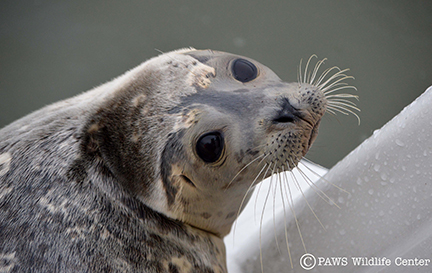
SSMMSN volunteer Cathy, who also volunteers at PAWS, said Hope was so fat, she looked like a beach ball with teensy little flippers - a true “blubberball”. That thick layer of blubber will help her transition to foraging once again all on her own - and keep her warm in the cold winter waters. Hope is shown here just before leaping off the boat transom into Puget Sound near Everett’s Jetty Island. She is sporting a NOAA orange rehabilitation tag #26583 on her rear flipper.
Thanks so much to PAWS’ amazing staff for nursing Hope back to health and giving her another shot at a long, happy life. If a pup is able to overcome a 50-50 chance of survival the first year, the average lifespan of a harbor seal is 25-30 years. With luck, maybe we’ll see Hope at an area harbor seal rookery with her own pup in a few years.
If you are out boating and see a seal or sea lion that is tagged, please try to read the number through binoculars or long telephoto lens and report the location by emailing Seal Sitters. We will contact the appropriate agency with the tracking data for scientific studies on survival of rehabbed animals.
Tough times for seal pups and the volunteers who protect them
Mar/17/17 07:31 PM
 Seal Sitters’ hotline received several calls early Tuesday morning about a seal pup onshore at the small cove just south of the West Seattle water taxi landing.
Seal Sitters’ hotline received several calls early Tuesday morning about a seal pup onshore at the small cove just south of the West Seattle water taxi landing. In a heavy rain, First Responders Robin and Nina established a perimeter to give the pup some space despite being about 20 feet from a very busy sidewalk. Commuters, rushing to catch the ferry or by bicycle to downtown, slowed down to admire the small, light-colored pup and read the informational signs on sandwich boards and stakes.
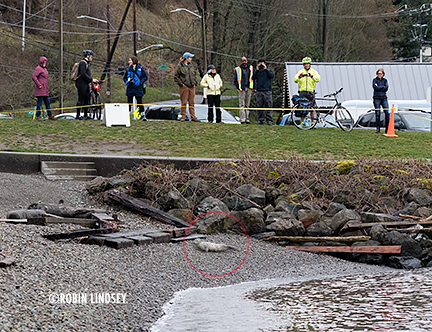
It is not unusual at all for pups to rest 12 hours or more onshore. Like many of the weaned seal pups Seal Sitters looks over during winter months, Granite was too thin. We didn’t realize quite how thin and dehydrated he truly was until late in the day, when he moved down to the water’s edge, allowing us to better evaluate his body condition. Granite was also increasingly lethargic.
Due to the late hour and early evening closure of PAWS Wildlife Center in Lynnwood, it was determined that a rescue would take place the following morning, knowing full well that euthanasia might be necessary. Capture and handling causes tremendous stress to a wild animal and that in itself can sometimes be the tipping point between life and death. It is not taken lightly. Granite did not seem to be suffering and there was no coughing or discharge from the nose or mouth, signs of respiratory disorders. There were no visible wounds. It was our fervent hope that the pup would return to Elliott Bay for at least several hours, foraging on squid or small fish to gain strength and hydrate.
Granite went back into the bay about 7:45 pm, but returned shortly after to the same spot on the beach where, to our knowledge, he spent the remainder of the night. Volunteers were disheartened that he had returned without nourishment.
At 6:30 am the following morning, Robin checked the beach in the rain and dark. It was empty. Sadly, she could see Granite’s body submerged offshore, just out of reach in waters too deep for wading. Within minutes, the tiny body disappeared as the tide receded, swept out into the black waves. The pup had died overnight.
First Responder Lynn arrived with a net and volunteer John helped in the search, but there was no sign of the pup. By odd coincidence, Seal Sitters volunteer and dive instructor Richard Anderson happened to appear with a colleague for a dive in the popular cove. They retrieved the pup, who was placed on the pebbled beach, given a quick exam and transferred into a cooler. Just before pulling out of the parking lot to make the drive to Lakewood for necropsy, Robin watched a woman with her dog traverse the cove, across that same spot where the weak and vulnerable pup had lain.
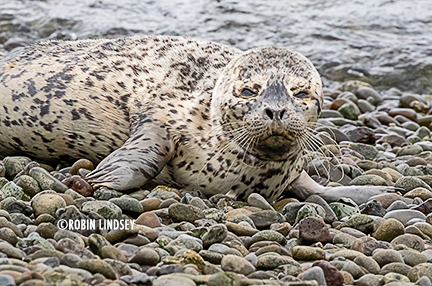
A seal pup’s condition can take a sudden and tragic turn for the worse - in a matter of days. Up to 50% of harbor seal pups will not survive the first year of life. Contributing factors to pup mortality are: conditions associated with fetal development or premature birth, disease, predation by shoreline predators or domestic dogs, infection, dehydration or starvation.
Thanks to the volunteers and public who ensured Granite some dignity at his last haul-out, free from disturbance or harm. It is very sad for all involved, but there is small comfort in knowing that the beautiful, intricately spotted pup died in peace on his little chosen beach.
It's raining cats and dogs - and seal pups
Mar/14/17 01:00 PM
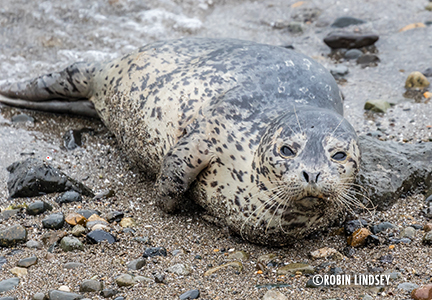
Longtime Hotline Operator Larry’s phone buzzed just before 3 with a call about a seal pup trying to come ashore at Jack Block Park’s public beach, notorious for illegally off-leash dogs. So, First Responder Robin zipped down the hill and was at the nearby location within minutes. In the pouring rain, a small, thin pup was sound asleep on a little sliver of sand at the far corner of the beach. Yellow “Protected Marine Mammal” tape was stretched across the only public access point at the opposite end. First Responder Lynn arrived to take a quick peek at the little one as well.
Every 15 minutes or so, the incoming tide lapped over the pup’s rear flippers forcing him to keep moving a few feet further down the beach. The pup was thin and seemed exhausted. Once Robin was convinced the pup might actually remain onshore, she called Volunteer Scheduler Colette who checked the online calendar. About 1/2 hour later, while Robin was rummaging in her car trying to find a dry pair of gloves, the pup left the beach. Of course, volunteer Kate arrived minutes later, only to miss seeing the pup.
After looking at photos of the seal’s stunningly marked coat, Kate remarked that the pattern looked just like granite. They waited patiently for quite some time for Granite to return for a rest, but finally Kate was sent home. After hanging out awhile longer and still no sign of a glistening head out in the flat gray, rain-splattered bay, Robin started removing the tape and cones from the sidewalk.
Just before leaving, she did a final scan of the beach. What was that light little shape at the tide line at the far opposite end? Wood? A rock? It was sneaky little Granite. Hustling down to the wide cement walkway leading to the Jack Block pier, Robin established yet another perimeter to keep the occasional curious people back a reasonable distance. The tired pup was just a foot of two beneath the wire fencing along the landing. Once again, volunteers headed down to help out. Just minutes before Betsy and Stephen arrived, a series of waves swept over Granite and he swam off. His head broke the surface of Elliott Bay just long enough to say goodbye and then, he vanished.
The beach was monitored until after high tide around 6:40pm. Jack Block Park closed at dusk, so volunteers did not need to worry about his safety if he returned during the night.
Seal pup has close call with off-leash dog at Seattle park
Mar/13/17 07:06 AM
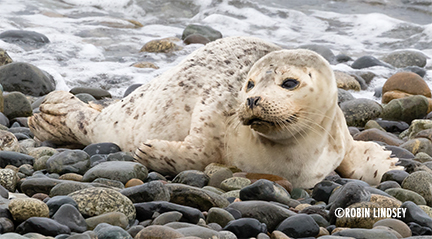
The seal pup was found resting at the water’s edge near Point Williams, a popular fishing spot. Robin hustled to get a tape perimeter up to establish a safety zone and considerate fishermen avoided the area within the tape. Volunteer Scheduler Lynn J began making calls, lining up volunteers to fill out what was expected to be a long day. First Responder Lynn arrived at the beach to offer assistance.
For the next few hours, undaunted by rain and breezy conditions, enthusiastic volunteers Molly and Sally answered questions from the public, who had a clear and close-up view of the beautiful pup. Around midday, the weather began to improve. Lots of people thanked us for Seal Sitters’ work and we received many an inquiry about how to volunteer. Leashed dogs of every size and color sat patiently (and received hugs and kisses) at the perimeter while owners chatted with volunteers.
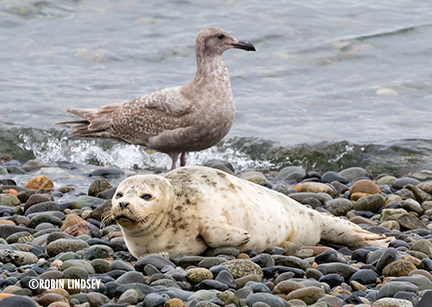
The tide crept in and so did the pup, who ended up nestled in the large boulders and logs near the path. Volunteers Kristen, Cathy and Todd happily provided information on harbor seal biology and the need for rest in order to stay healthy. Young volunteer Caitlin and her friend Etta assumed a post at the tape perimeter on the beach and pointed out the pup’s position to those willing to walk over the slippery, woody beach for a peek look.
A successful day was almost catastrophic at the end as an uncontrolled, off-leash hunting breed dog dashed under the tape and along the jagged rocks, headed straight for Cha-cha’s hiding place. The dog could definitely smell the seal pup. The owner yelled fruitlessly for the dog to stop. She finally managed to grab the dog’s collar just feet from the vulnerable seal, sound asleep on the beach below and totally unaware of the approaching danger. The woman did not say a word of apology or remorse afterwards and walked away, refusing to leash her dog. Concerned onlookers said she is notorious in Lincoln Park for disrespecting city leash laws and letting her dog run wild. DOGS ARE NOT ALLOWED, LEASHED OR UNLEASHED ON SEATTLE BEACHES.
Thankfully, a crisis was narrowly averted. Each year in Washington, dogs injure or kill harbor seal pups - including last year’s apparent domestic dog attack in West Seattle.
Cha-cha continued to rest onshore until a series of large waves swept over the pup, who swam off in the shimmering waters of Puget Sound around 6pm. Lynn and Robin waited to make sure the pup did not return and then gathered up stranding materials and hiked out of the park at dusk on a beautiful evening.
With some respiratory issues and a small belly wound, Cha-cha may well need increased time out of the water over the next days to rest and warm up. If you see a pup onshore, please call Seal Sitters’ dedicated hotline @ 206-905-SEAL (1925) and, if you can, keep people and dogs away until a first responder can arrive.
Rain and rainbows as volunteers protect seal pup on public beach
Mar/12/17 08:33 AM
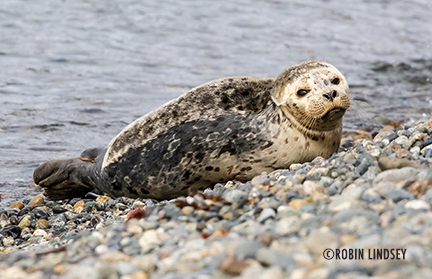
Around 2 pm, Hotline Operator Julia received a report of a pup onshore near Colman Pool. First Responder Robin drove down to the forested park and made the long hike in along the beach, toting a rolling luggage cart complete with cones, sandwich boards and stakes. She spied the fluffy and relatively robust white belly of a pup, resting at the waterline. Up close to the woody debris and with a rapidly incoming tide, it was uncertain how long the pup would linger.
Battling sustained winds and 20 mph gusts, putting up a tape perimeter around the sleeping pup proved a challenging task. Cones and barricades blew over. Tape snapped and whipped in the wind. Despite it all, the pup slept soundly.
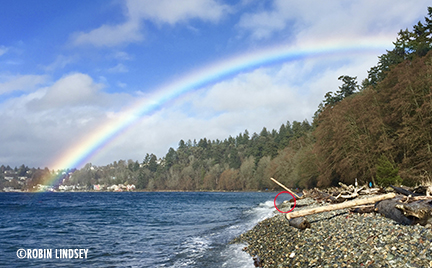
As the tide encroached on the beach, the pup wriggled a few feet up, snuggling against a large brown log. Curious onlookers were able to get a sneak peek of the sleeping pup from behind the tape at each end of the perimeter.
The wind was relentless. As the afternoon wore on, the skies blackened ominously to the southwest behind passing Vashon-Southworth ferries and a lone fisherman, who steadily cast his line into Puget Sound. The pup, nicknamed Cha-cha, slept comfortably, but was alert off and on to activity in the park and wind-fueled waves sweeping the shoreline. When the storm finally hit around 5pm, most people hurriedly left the park.
Cha-cha returned to the water around 5:30. Lynn and Robin gathered materials and hiked out as wind and rain swirled around them - and not a minute too soon - just as the storm hit the shores of Lincoln Park.
Snoozy catches some ZZZs at Lincoln Park
Mar/02/17 07:35 AM
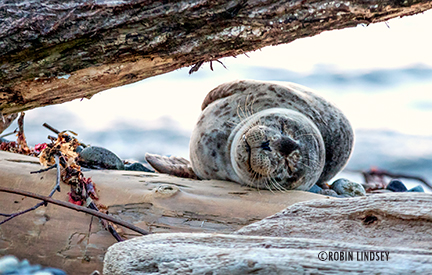
Just north of Colman Pool, she found a snoozing pup, snuggled in the driftwood and only 10 feet from the paved walkway. Battling windy conditions, Lynn put up a shaky perimeter as her signs flew away, yellow tape billowed and one barricade fell over with a crash. A helpful man lugged two large rocks up from the beach to hold the barricade upright.
Fortunately, only a handful of people were out braving the cold winds. A fisherman said the pup had been resting there for a few hours. He had watched as a woman approached on the beach, noticing the pup only when her off-leash dog began barking at the small seal. Dog are not allowed on public Seattle beaches, leashed or unleashed, and pose dangers to vulnerable pups!
The tide was rising and the sun was setting rapidly. First Responder Robin arrived to lend a hand and observe the pup, nicknamed Snoozy, who was alert off and on to activity and seemed relatively healthy. The volunteers left the park after dark.







